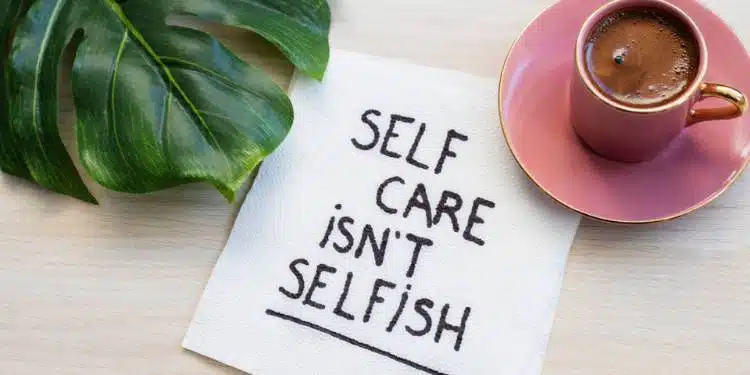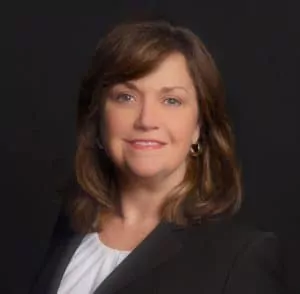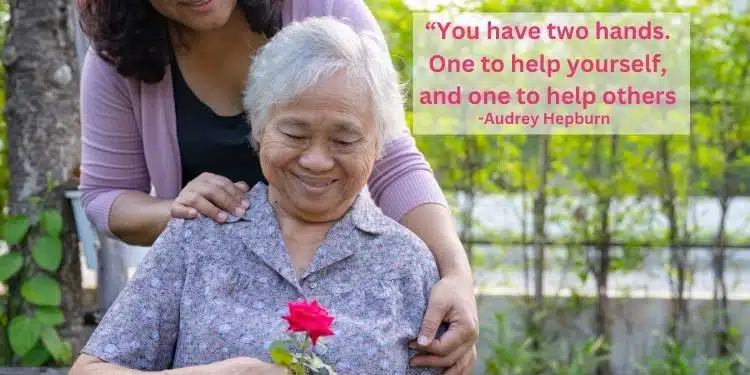Author: Annette Fields
A New Year is upon us and the world is abuzz with new resolutions. This is the time of year people make meaningful goals like increasing their exercise, eating healthily, or finally tackling that giant reading list of books.
If you’re one of the millions of Americans who is a caregiver, your resolutions might look a little different this year. According to research from VITAS Healthcare, 32% of caregivers describe their experience as stressful. After more than a decade of leading teams in senior living communities, I know all too well the prevalence of caregiver burnout.
Resolutions as a caregiver can be challenging because they feel selfish – but the less we take care of ourselves, the less we can provide purposeful care to others. Self-care for caregivers is essential. I’d like to offer five potential New Year’s resolutions that may help you improve your overall well-being.
Engage in Acts of Self-Care
Effective self-care is all about execution and ‘self-care’ means different things for individuals. There are things we can do for ourselves to provide both more immediate and longer-term stress relief. However, for many of us, true self-care might include canceling plans when we are too tired, asking for help when we don’t know what to do next, and saying ‘no’ to obligations when we feel overwhelmed.
To create a helpful self-care routine, experts from Everyday Health shared their best tips:
|
Create a System to Monitor Your Energy to Avoid Burnout.
According to Healthline, if you’re exhausted all the time, feel isolated from the world, and find yourself getting irritable, it may be time to consider implementing an active system to avoid burnout.
So, where do you start? Here’s a story about a daughter caring for her aging mother. She had a list of activities that she enjoyed, and implemented a three-strike rule: if she felt frustrated, hopeless, or exhausted for three days in a row, she would schedule a self-care activity, such as:
- Spending time with friends and family
- Attending her weekly book club (this caregiver was an avid reader)
When those activities didn’t help, she took the day off. Simple as that! While this system may not work for everyone, you can embrace its spirit by focusing on recognizing signs of burnout in yourself and honoring your feelings in a meaningful way.
Find Help When You Need It.
As a caregiver, it’s easy to forget to care for ourselves. Some caregivers feel it is a sign of weakness to ask for help, but that is simply not the case! I firmly believe that every caregiver should have a support system that includes:
- A medical professional to offer advice and opinions on your loved one
- An organization of other caregivers to provide support from an ear that knows what you’re going through
- A friend or family member who can step in and take over caregiving duties when they feel overwhelming
Don’t feel limited by these suggestions, though – caring for your loved one takes a village, and it is vital to ask for the help you need when necessary.

Create a Positive Mantra When You Feel Guilty.
Guilt is a universal experience for many caregivers. Many of us feel we aren’t giving enough attention to jobs or family, and vice-versa. It can seem like there is no way to win, which is why it’s important to reframe your needs. The experts at Aging Care have a fantastic set of mantras to repeat to yourself when you need some reminding:
- When I feel imperfect, I will remind myself that perfection is impossible – I am doing my best in these circumstances.
- When I feel frustrated, I will remind myself that my loved one didn’t choose this way of life for themselves. However, I didn’t choose this life for them either, so I will not be a martyr to their illness.
- When I feel overwhelmed, I will remind myself that taking care of myself and stepping back isn’t selfish. I cannot pour from an empty cup and taking care of my needs benefits everyone – especially my loved one.
Allow Yourself to Not Keep These Resolutions or Keep Them Partway.
I can’t tell you how many times I’ve made resolutions that lasted only halfway into January. I would miss an opportunity for self-care, snap at my loved one, and eventually disregard the resolution completely because it just seemed too hard. I didn’t wake up on January 1st as a perfect person, and neither did you. It takes time to make changes, and some of the most lasting changes are incremental. So, consider this full permission to make mistakes and meet yourself where you are.
The Bottom Line
Caregiving is hard work, often both physically and emotionally. Make sure you take care of yourself while you are taking care of your loved one. There’s an old saying, “You can’t pour from an empty cup”. Do what you have to do for yourself so you can provide your best care.
About the author: Annette Fields

Annette Fields is the executive director of Vineyard Johns Creek, an assisted living community in Johns Creek, Ga. specializing in care for those suffering from memory loss. Vineyard Johns Creek is one of several Vineyard Senior Living properties in the United States. Annette has nearly fifteen years experience in healthcare and senior living.
FAQs
Taking care of yourself while caregiving is crucial for both your well-being and your ability to provide effective care. Here are some commonly asked questions about self-care for caregivers:
What are some signs of caregiver burnout?
Signs of burnout include fatigue, changes in sleep patterns, increased irritability, feelings of hopelessness, and neglecting one’s health.
How can I find time for self-care while caregiving?
Schedule regular breaks, enlist the help of other family members or friends, and consider utilizing respite care services to allow for periods of rest.
What are some simple self-care activities for caregivers?
Engage in activities you enjoy, such as reading, listening to music, taking short walks, practicing deep breathing exercises, and maintaining hobbies that bring you joy.
How can I manage stress and anxiety as a caregiver?
Practice stress-reducing techniques such as meditation, mindfulness, yoga, and deep breathing exercises. It’s also important to identify and communicate your needs and seek support when necessary.
How do I handle feelings of guilt associated with self-care?
Understand that taking care of yourself allows you to provide better care for your loved one. Remind yourself that self-care is not selfish; it’s necessary for maintaining your overall well-being.
What role does sleep play in caregiver self-care?
Prioritize getting enough sleep by establishing a regular sleep routine. Lack of sleep can contribute to stress and negatively impact your ability to provide effective care.
How can I maintain a healthy lifestyle while caregiving?
Focus on maintaining a balanced diet, engaging in regular physical activity, and staying hydrated. These habits contribute to overall well-being and energy levels.
What should I do if I feel overwhelmed or depressed?
Reach out to healthcare professionals for support, consider counseling or therapy, and don’t hesitate to talk to friends and family about your feelings. Depression is a serious concern that requires attention and care.
How can I involve others in supporting my self-care efforts?
Communicate your needs to family and friends, and be specific about how they can assist you. Enlist their help in caregiving tasks, and don’t hesitate to ask for support when needed.










